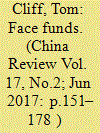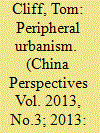|
|
|
Sort Order |
|
|
|
Items / Page
|
|
|
|
|
|
|
| Srl | Item |
| 1 |
ID:
177975


|
|
|
|
|
| Summary/Abstract |
This article presents economic interactions in two Chinese socioeconomic realms: urban funerals and village-level welfare funds. Ethnographically examining these realms reveals that each of them comprises a diversity of economic processes and moralities. Our first point is thus that ‘the economy’ is a multiple rather than a singular entity. But just as important are the means by which actors move from one form of economy to another, bridging different sets of moral rules. Diverse economic processes and the methods of moving among them exist everywhere, but in China they also reflect the legal ambiguity under which much economic activity takes place. In addition to detailing the differing forms of economy and the ways of moving among them, we show how the intersection between these processes helps to reproduce a certain social order, at least under the socioeconomic conditions at the time of our research.
|
|
|
|
|
|
|
|
|
|
|
|
|
|
|
|
| 2 |
ID:
153571


|
|
|
|
|
| Summary/Abstract |
In semi-industrialized rural China, villagers are getting together to
create their own micro welfare state. In response to inadequate state
support for the poor, disabled, and especially elderly of the village,
entrepreneurs form rotating credit associations and underground banks
that fi nance welfare schemes exclusively for those who hold a household
residency ( 戶口 hukou) in their village. Most of these schemes eschew
any formal engagement with the state, but where money, legitimacy,
and social stability are involved, the state is never far away. Th is paper
examines the development and propagation of these highly successful
nonstate welfare funds in parallel to the seminally unsuccessful state
eff orts at encouraging philanthropy, and reports on recent state eff orts
to co-opt and control this flourishing, indirectly contentious, civil
movement. Th e fairly gentle nature of state-society interactions to date
shrouds an implicit contest over political space at the grassroots level.
|
|
|
|
|
|
|
|
|
|
|
|
|
|
|
|
| 3 |
ID:
179165


|
|
|
|
|
| Summary/Abstract |
In a context of increased state expectations that Chinese private enterprise will “give back to society,” this article argues that the way that locally developed private enterprises engage in welfare and poverty relief in rural China is decisively shaped by the social networks of the owners. Three very different industrial structures located near to each other in Fanhua County, Shandong Province, are compared. These are: a small group of large conglomerates situated near the county seat, a networked cluster of over 3,000 mostly small and micro furniture companies, and a cluster of midsize companies that produce sheet steel. Industrial structures have shaped the owners’ social networks in each of these three industries. The norms embedded in the businesspeople’s social/business networks, which are affected by the influence on the networks of political authority, factory-owner peers, and ordinary locals, orient the private enterprise owners toward providing or not providing social welfare in particular ways.
|
|
|
|
|
|
|
|
|
|
|
|
|
|
|
|
| 4 |
ID:
122932


|
|
|
|
|
| Publication |
2013.
|
| Summary/Abstract |
This paper analyses the motives, processes, and effects of urbanisation in Korla, a small but rapidly expanding city in northwest China, where the author conducted over two years of fieldwork. The paper aims to show that the historical monuments of the urban environment are physical manifestations of a stirring, and often violent, program of ideational and socio-economic change that is directed at the periphery and all of its residents - even as some of those residents are also posed as agents of the ongoing transformation.
|
|
|
|
|
|
|
|
|
|
|
|
|
|
|
|
| 5 |
ID:
144377


|
|
|
|
|
| Summary/Abstract |
The socialist-era danwei lives on in contemporary, ever-reforming China. Ironically, the processes of reform helped to enable the perpetuation of the traditional danwei’s paternalistic practices by concentrating monopoly power in selected, partially market-listed, centrally owned enterprise groups. The Tarim Oilfield Company is an outstanding example of this balancing act between socialist and market structures—a neo-danwei. This article maps these structures using detailed ethnographic data gathered over two years working in the company. Multiple subjective viewpoints show that distinctions between different categories of employee are crucial to maintaining the danwei in the midst of marketization. Like the socialist-era danwei, the oil company produces dependency and constrains social mobility. Yet, amidst glorification of open competition and individual achievement, the desire to enter a danwei is as strong as ever. The certainty of danwei life is highly valued; stability becomes a status symbol.
|
|
|
|
|
|
|
|
|
|
|
|
|
|
|
|
|
|
|
|
|